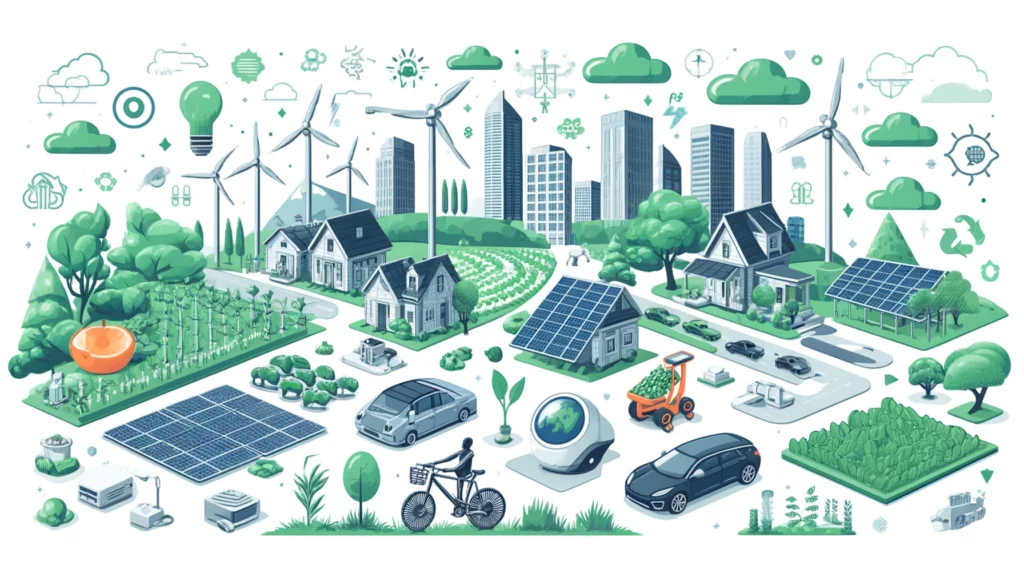Sustainable Technology: A Brief Overview
If you’re a multibillion-dollar international conglomerate with a carbon footprint to match, chances are that a global push for sustainability doesn’t exactly come as thrilling news. For sustainability tech companies, reaching climate goals set out by governments is no easy feat; it means large-scale revamping across countless industries, tossing out the simple, affordable processes of the past in favor of newfangled, often more expensive green ones. These issues and more – including the polluting incumbents’ political power – have long created a gnarly uphill battle for companies developing such novel methods.
But now, as pressure from governments, consumers, and the climate itself ramps up, sustainable alternatives to polluting processes are growing in popularity. This demand, coupled with years of technological development, has led to a rise in nifty solutions that serve as legitimate substitutes to traditional methods without sacrificing efficiency or breaking the bank. Sustainability tech, as it’s often called, is now becoming increasingly integrated in corporate processes, municipal projects, and everyday life.

The Growing Landscape of Sustainable Tech Companies
Twenty-odd years ago, today’s sustainability tech landscape would’ve seemed unrecognizable. Back then, the reality of climate change had just recently set into the global public consciousness, and it was only in the previous decade that some major international efforts to address it had come about. The 2000s saw the first wave of private Western investments into climate-focused companies, mainly renewable energy ventures like solar and wind power. As argued by investment firm Cambridge Associates, investors lacked knowledge or experience with these new technologies – but, emboldened by high-profile activism like that of Al Gore, still sunk $25 billion into the sector between 2006 and 2011. Their overeagerness, combined with the financial crisis, sinking oil prices due to fracking, and cheap technology from China, soon made the whole scene come crashing down. This fiasco is known as Cleantech 1.0.
Many sustainability tech companies went under, never to be heard from again. But others, especially those from China, not only survived but thrived in the market vacuum in the next few years, helped along by legislation like the 2015 Paris Agreement and heavy-handed governmental investment stemming from the country’s own goals to establish itself as a green technology hub. Today, China produces 80% of the world’s solar panels, and its renewable energy and electric vehicle (EV) companies are among the most prolific in the world. In the West, investors learned their lessons and returned, this time focusing on scalable tech that has clear and focused goals. Here, too, policies like Paris and (in the US) 2022’s Inflation Reduction Act (IRA) have made sustainable tech feel welcome.
Meanwhile, climate change barrels on, also impacting consumers’ priorities and executives’ outlooks. A 2023 Deloitte study found that ‘almost every CxO [global C-level business leader] surveyed’ had their business impacted by climate change in some way – mostly due to scarcity of resources and changing consumer preferences. 75% had increased their investments into sustainability over the past year. This is reflected in the 17% global investment boost the ‘low-carbon energy transition’ received in 2023, with EVs ($634 billion; 36% increase), energy ($623 billion; 8% increase), and power grid ($310 billion) coming out on top, according to research by Bloomberg NEF. China continues to dominate the sector, accounting for 38% of global investment – $676 billion – followed by the EU ($360.5 billion) and the US ($303.1 billion). The thriving scene is also enticing a slew of startups, many of which are hoping to claim their slice of the pie by expanding into sectors where sustainable tech has not yet taken off.
Read also: Top 5 Climate Tech VCs & Investors in 2024
Leading Sustainability Tech Companies by Sectors
Energy
In 2023, about 30% of the world’s energy came from renewable sources, fueled by a massive industry. Unsurprisingly, a good chunk of its infrastructure hails from China. Its solar industry is especially prolific, backed by state support and domestic demand and competition (as reported by Financial Times). China’s top solar companies include Tongwei, Longi, JA Solar, Trina Solar, and Yingli Solar (to name a few); in addition to widespread domestic use, their panels also dominate foreign markets. The country also boasts a sizeable wind power sector, accounting for 65% of global wind capacity in 2023 (according to Wood Mackenzie). Its leading companies – Goldwind, Envision, Windey, and Mingyang – occupy four of the global top five slots, with the only Western company being Denmark’s Vestas, which operates the most turbines globally.
Read also: Top 5 Renewable Energy Startups in 2024
Transportation
EVs have had somewhat of a meteoric rise in the past few years; they made up 18% of total car sales in 2023, compared to just 2% in 2018. Much of their rise in popularity can be attributed to US company Tesla, who transformed their status from a fringe technology that was neither practical nor cool to the powerhouse they are today. A host of other car companies are following in their footsteps, but once again, a group of Chinese firms are at the forefront. Leading the charge is BYD, which contributes about a third of NEV (New Electric Vehicle – electric or hybrids) sales in China; four in ten of the country’s vehicles are electric (as reported by Electrive). BYD’s electric buses are also deployed throughout China and the world, though fellow company Yutong dominates the domestic market. Adjacently, many cities are now home to thousands of ebikes and scooters courtesy of companies like Lime, Voi, and Bolt, providing an eco-friendly alternative to driving.
Agriculture
Energy and EVs may be the furthest developed sustainability tech industries by far, but the agricultural sector – which accounts for 22% of emissions, according to PwC – has seen plenty of change, too. One such shift is the emergence of plant-based meat alternatives like those by Beyond Meat and Impossible Foods, which have long hit supermarket shelves and restaurant menus. Though research on their exact impacts varies, a study by Boston Consulting Group estimates that investment in meat alternatives leads to 11 times more greenhouse gas reduction than in EVs (as reported by The Guardian). Other so-called agritech focuses more on the farming aspect; for example, agriculture giants like John Deere are employing AI-driven weed identification systems to minimize how much herbicide – a detriment to the environment – is used (as reported by BBC).
3 Sustainability Tech Startups to Watch
Winnow

Food waste accounts for up to 8% of human-generated greenhouse gas emissions; it generates the equivalent of 32.6 million cars’ worth per year in the US alone. UK-based sustainable tech startup Winnow, founded in 2013, wants to fight this with AI. Its process begins when food is dumped into one of the company’s smart bins at a restaurant. The company’s AI platform Winnow Vision weighs and scans it before determining the wasted food’s value, which then helps chefs reduce food waste. Winnow Vision is over 80% accurate in identifying wasted food – compared to busy humans working in the kitchen, who come in at 75% – and can allow restaurants to reduce food waste by 50% in the first year, according to the company’s North American managing director Peter Krebs (as reported by Singularity Hub). The system is now used in over 2,700 kitchens including all IKEA restaurants in the UK and Ireland, where it cut food waste in half.
Carbon Robotics

It’s not just food waste that AI has a use for; as already proven by a couple of agriculture heavyweights, it has a knack for weeding as well. But Carbon Robotics, a sustainability technology startup founded in 2018 out of the US, combines these talents with lasers to really give those pesky weeds a run for their money. The company’s machine – aptly named the LaserWeeder – is the first of its kind. Equipped with an AI platform capable of processing 4.7 billion images per hour, the vehicle can zap away 5,000 weeds a minute as it drives over the fields; the system works on over 100 different plants. Frying the weeds negates the use of herbicides which, even if sprayed with AI-level precision, can still contaminate surrounding crops and soil. Using a laser, the scorched remains simply compost back into the soil (as reported by BBC). The machine is already in use across the US and Canada, with units frequently sold out.
Mighty Buildings

US-based startup Mighty Buildings, founded in 2017, wants to address two problems at once: the US’s gap in affordable housing and the environmental impact that would come from filling it. The buildings and construction sector accounts for 37% of global emissions (residential construction clocks in at 27%), with the construction of one house creating up to 100 tons of CO2. Mighty Buildings claims to produce 99% less waste through its 3D-printed houses and aims to achieve carbon-negative construction by 2028. Its buildings, which the company says take only days to construct, come in several shapes and sizes and use 60% recycled materials. Mighty Buildings has also partnered with Fortera, a company that turns CO2 into cement, reducing the latter’s carbon emissions by 60%. Though only one house exists as of May 2023, the company has plans to build entire communities in the US and the Middle East.
Read also: Top 5 Carbon Capture & Removal Startups in 2024
Why Might Companies Be Interested In Investing in Sustainability Tech Startups?
There are a few reasons why businesses might want in on sustainability. Most obviously there’s image; considering consumers’ ever-growing concern over climate change, any CEO worth their salt should make strides to address it. Government support and incentives, like 2022’s IRA, are also important considerations. But aside from the obvious benefits of going sustainable, investing in startups to do so can be especially useful for larger corporations who can’t keep up with the smaller companies’ rates of innovation. Also, there could be piles of money to be made; as the entire world slowly pivots towards sustainable tech to run its major industries, companies – especially those reliant on the old, polluting systems – might like to get on board with fledgling technologies before they take off. This is already a common occurrence; for example, oil giant BP’s investment arm plans to pour most of its funding into Greentech startups. Another oil giant, SLB, recently announced a joint venture with Norwegian carbon capturers Aker.
The Future of Sustainable Technology Companies
With the market of green technologies possibly reaching $12 trillion by 2030 (as estimated by Roland Berger) and the low-carbon energy transition hoovering up $1.77 trillion in 2023 investment, the future of sustainable tech seems in good hands. Still, that doesn’t mean there won’t be obstacles. In terms of business, problems like integrating new tech into existing systems, high development costs, long timelines, and the sheer power of the fossil fuels industry aren’t likely to go away anytime soon.
But the more serious issues hail from the pace of climate change itself, and whether companies’ and governments’ efforts will be enough to head it off at the pass. Even now, some of the most promising sustainable technologies in use today might not be as green as they seem. Electric cars, for example, might not harm the environment while driving, but the mines and factories where the minerals in their batteries hail from sure do. And if the electricity they consume comes from coal, that also leads to further pollution (as reported by The New York Times). They’re still a clear net positive over gas cars, but the situation is a case in point for a bigger issue: the need to deploy decarbonizing strategies across industries, not just where there’s a market.
Research by PwC shows that despite being the sector with the highest emissions, companies focusing on decarbonizing industrials (including mining, manufacturing, and resource management) receive a disproportionately small share of startup investment. While this has been slowly increasing in recent years, more PwC research shows that in order to reach net-zero emissions by 2050, the world must decarbonize seven times faster than it is now – and, according to the IEA, over a third of technology vital to this goal is not yet on the market.
However, as with any cutting-edge industry, there’s the risk of death by hype; as seen with the first wave, investors overestimating the potential of the sector might lead to them inadvertently tearing the whole thing down. While some mature tech like wind, solar, and electric vehicles are in the swing of things, newer processes like green hydrogen and fusion still need to prove themselves without crumbling at the first whiff of trouble.
Read also: Top 15 Green Tech Companies & Startups in 2024
Bottom Line
Looking at sustainable tech’s most successful businesses, no single company is singlehandedly leading the sector into a green future. Nor did any of them solve anything overnight. The key to success, it seems, is attentive yet controlled progress into a specific area of focus; it’s only now that decades-old companies like EV manufacturers are really hitting their stride, after all, and Cleantech 1.0, showed us that overenthusiasm and vaguely defined goals can be detrimental. But climate change isn’t waiting for companies to get their skates on, and research by the International Monetary Fund shows that mitigation efforts are already behind schedule. It seems, therefore, that what’s sustainable for business is simply not enough for the climate.





